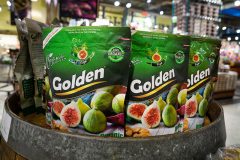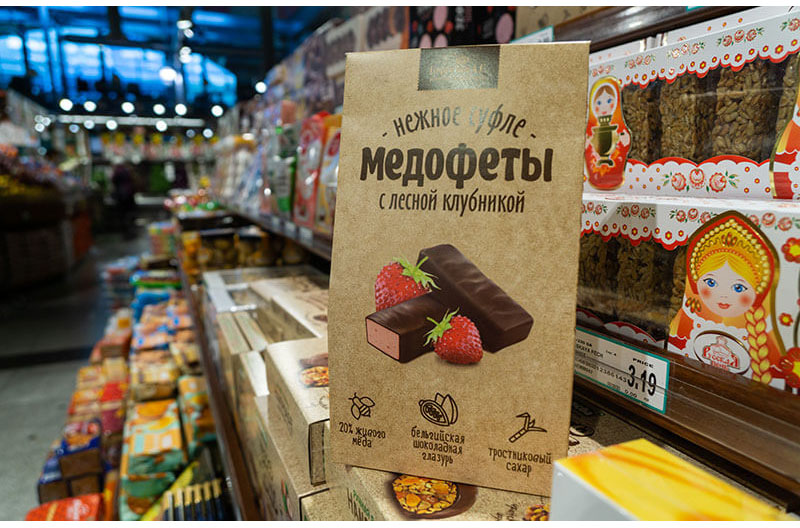by Mary Margaret Stewart / staff writer
Chicago, Illinois, is one of several big cities in the Midwest where diversity in food and culture is not hard to come by. And Dino Svigos, co-founder of Chicago-based Fresh Farms grocery stores, was quick to tap into this multicultural marketplace. 
“Nothing from America. You want canned cheese or mac and cheese? You can’t find it in my store,” he said. “If somebody wants American products…they can go to Costco. They can go to Walmart. They can go anywhere, so why come to me?”
Svigos was 19 when he started Fresh Farms with his two brothers, back in 1980. Getting into the multicultural marketplace came easy, as their parents immigrated to the U.S. from Greece.
Produce, where Svigos and his brothers started, is what he termed “our backbone; our bread and butter; our lifeline.” Since every culture eats fruits and vegetables in some form or fashion, they began to get produce from around the world. Ultimately, his roots as first-generation American opened his eyes to the possibilities of a multicultural grocery store.
Today, the authenticity is what Svigos goes out of his way – or out of the country – to bring back to Fresh Farms. Right down to the feta cheese.
“[It’s] like you’re getting it in that country – in the small village of Greece, in the small village in France, in the small village in Ukraine or Russia,” he said. “What happens is, even those countries overseas have become so commercialized. They lose the flavors, the originality, the true taste of the culture.”
That true taste of culture is something that Mark Smith of Marquis Sales Co. has learned to grasp throughout his 38-year career in ethnic food marketing.

“You can’t try to sell private label saffron to someone who wants Goya saffron,” Smith said. “They’re super brand loyal to the brands that they grew up with in their home country or that their parents have been serving them as a second- or third-generation consumer. And they will literally shop different stores until they find the brand that they want.”
Back in the early 1990s, Smith founded Marquis Sales and was working in inner-city neighborhoods in Illinois.
“In the Midwest, especially in the major cities – Chicago, Milwaukee, Minneapolis, Detroit – there’s a huge diverse population,” he explained. “We went to the neighborhoods where those people were to sell the products.
“And while we were in the inner city, we noticed that there were a lot of Latinos. And I recall one time asking a store, what broker gives the Latino segment any attention? And the guy told me, ‘Nobody. You should do it.’
“So, we did something brilliant. We hired several Mexican Americans, and we started calling all of the Mexican stores and picking up Mexican lines.”
Smith said these pockets had been neglected by brokers and consultants because they weren’t glamorous, but “there’s a lot of people, and they eat.”
Plus, they like to cook and eat at home more than the mainstream consumer, according to Smith, which is music to grocers’ ears.
“You want this consumer in your store because they shop the entire store. They buy ingredients, they buy meats, they buy produce, they buy spices, they buy oil – they’re a big-basket shopper because they like to cook.
“I tell skeptical retailers – and there are still a lot of them that haven’t given the multicultural segment much, if any, attention – I tell them that my experience has been that for every ounce of effort you give this as a retailer, you get a pound in return,” Smith said.
The Illinois Food Retailers Association is a non-profit trade association whose membership is comprised of many independent, family-owned businesses throughout the state. Its focus is on the profitability and growth of these kinds of food retail stores.
“Certainly, in today’s marketplace, and certainly in the Chicago marketplace, the food industry is very diversified,” said Brian Jordan, president of IFRA. “I think today’s consumer enjoys experimenting with all different types of foods from all over the world.”
The Midwest has both more traditional-style marketplaces that offer multicultural sections as well as grocers devoted to a specific culture or cuisine, according to Jordan.
“For independents, they have the ability to move and change rather quickly,” he said. “And as markets change and neighborhoods begin to change, I think independents have the pulse of what’s going on within their community very quickly.”
At Fresh Farms, Svigos and his brothers spend between 60 to 80 hours on the floor with shoppers each week, constantly getting a pulse from the stores and, as he put it, allowing the customer to drive the future.
“If you talk to enough people throughout the course of a day – you got 3,000-4,000 people to come into your store every day, and you talk to a few hundred of them every day, they give you a few hundred different opinions,” he said.
And that face-to-face interaction is something that as a family-owned business Fresh Farms thrives off – making personal connections and building business up by word-of-mouth.
“I’m still old-fashioned. I still like one-on-one. I want to see when you taste something,” he said. “When I sample something, I want to see the reaction in your eyes as to how you feel about it. Not that you tell me all this ‘it’s so good’ just because you’re being nice to me. I want to see how the person really feels about it.”

